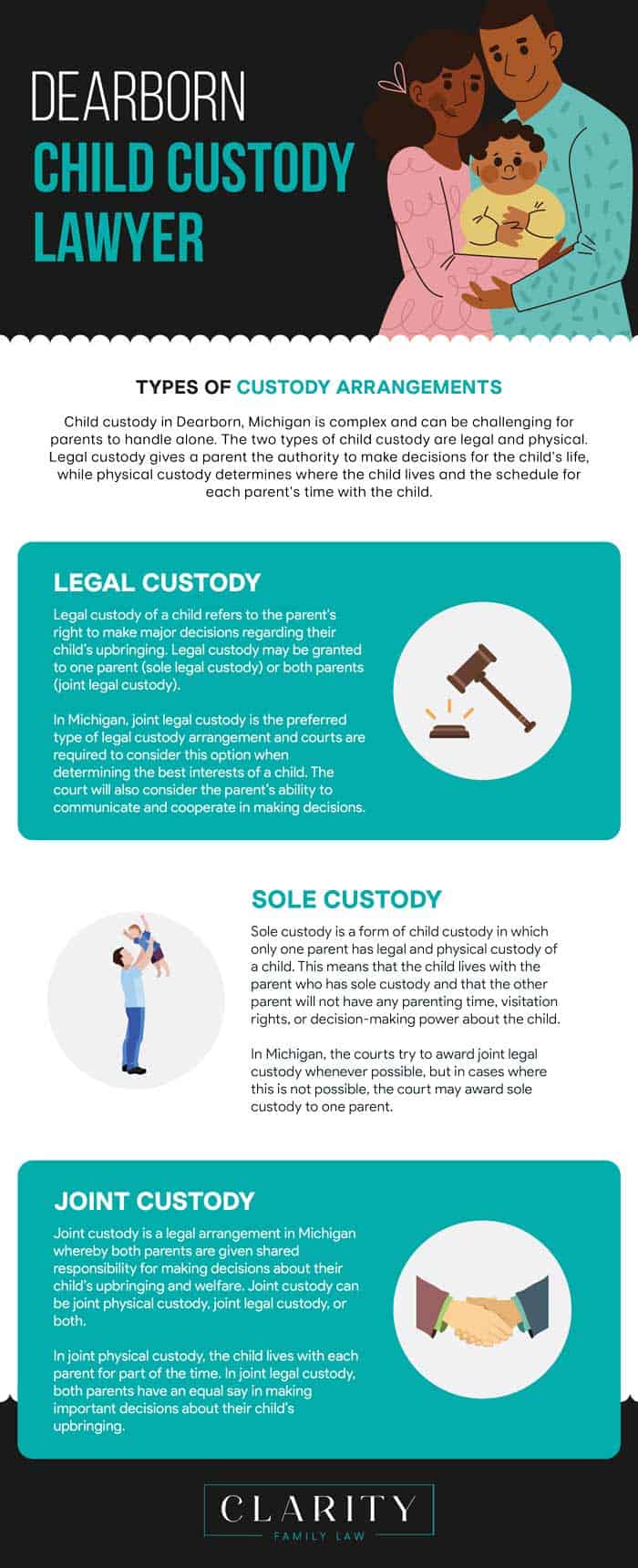If you are looking for a Michigan Child Custody Lawyer, it is important to understand the state's laws and procedures. Under Michigan law, child custody can be determined by either the court or the parents. If parents cannot agree on a custodial environment on their own, the court will ultimately decide who gets custody of a child.
When choosing a Michigan child custody lawyer, it's important to find someone who knows the state's child custody laws. An experienced child custody attorney can give legal advice on protecting your parental rights and ensuring the child's best interests are upheld.
Michigan child custody cases deal with various issues, such as decision-making authority, physical placement, parenting time, and financial support. The court considers the child's needs and the parent's relationship.
Hiring a Michigan child custody lawyer who understands family law is crucial. They can assist with paperwork, court hearings, negotiations, and mediation. A good lawyer also offers emotional support and guidance for making decisions that benefit the child.
If you need assistance with child custody proceedings, please call Clarity Law Firm firm at (313) 513-1919 for a confidential consultation.
Understanding Dearborn Child Custody Laws
When parents in Dearborn, Michigan are facing a child custody dispute, it is important to understand the laws that will apply. Dearborn is part of Wayne County and as such follows the state’s child custody laws. These laws determine how parental rights and responsibilities for a minor child are allocated between the parents.
The first step in understanding Dearborn’s child custody laws is to understand the two types of custody that can be awarded: legal custody and physical custody.

Legal custody refers to a parent’s right to make decisions about their child’s upbringing, including their education, religion, and medical care. While physical custody refers to the parent’s right to have physical possession of the child.
When parents in Dearborn cannot agree on a parenting time schedule, the court will use the Michigan Child Custody Act to determine the best interests of the child. The judge will consider several factors, such as the relationship between each parent and child, reasonable preference, each parent’s mental and physical health, moral fitness, ability to provide a satisfactory environment, and any evidence of domestic violence, sexual abuse, or neglect.
Types of Child Custody in Dearborn
Child custody in Dearborn, Michigan is complex and can be challenging for parents to handle alone. The two types of child custody are legal and physical.
Legal custody gives a parent the authority to make decisions for the child's life, while physical custody determines where the child lives and the schedule for each parent's time with the child.

In Dearborn, legal custody arrangements can be sole or joint. Sole custody means one parent has the power to make decisions about the child's upbringing. Joint custody requires both parents to agree on important decisions for their child.
Physical custody can also be sole or joint, with the child primarily residing with one parent and having scheduled visitations with the other parent. In joint physical custody, the child lives with both parents in separate households, either full-time or part-time.
Legal Custody
Legal custody of a child refers to the parent's right to make major decisions regarding their child’s upbringing. Legal custody may be granted to one parent (sole legal custody) or both parents (joint legal custody).
In Michigan, joint legal custody is the preferred type of legal custody arrangement and courts are required to consider this option when determining the best interests of a child. The court will also consider the parent’s ability to communicate and cooperate in making decisions.
Sole Custody
Sole custody is a form of child custody in which only one parent has legal and physical custody of a child. This means that the child lives with the parent who has sole custody and that the other parent will not have any parenting time, visitation rights, or decision-making power about the child.
In Michigan, the courts try to award joint legal custody whenever possible, but in cases where this is not possible, the court may award sole custody to one parent.
Joint Custody
Joint custody is a legal arrangement in Michigan whereby both parents are given shared responsibility for making decisions about their child’s upbringing and welfare. Joint custody can be joint physical custody, joint legal custody, or both.

In joint physical custody, the child lives with each parent for part of the time. In joint legal custody, both parents have an equal say in making important decisions about their child’s upbringing.
Advantages and Disadvantages of Joint Custody
When it comes to determining child custody in Michigan, one of the most popular options is joint custody. This form of legal arrangement can have many benefits for both parents and children, but it's important to consider the pros and cons before making a decision.
Pros:
- Joint custody allows both parents to remain involved in their child's life. Both parents will have the opportunity to maintain a relationship with their children, even when they are not living together.
- Children in joint custody arrangements tend to have better emotional health and fewer behavioral problems than those in sole custody arrangements.
- Joint custody allows for more flexibility and less disruption in the child's life since they will be able to maintain relationships with both parents.
Cons:
- Joint custody can be difficult for parents who do not get along or are unable to cooperate.
- Children may experience confusion and stress over having to switch households frequently.
- Joint custody can be expensive since both parents will be responsible for the child’s expenses.
Child Custody Outside of Marriage
When a child is born outside of marriage, it can be difficult for parents to agree on child custody and visitation. In Michigan, unmarried parents have the same rights and responsibilities as married couples when it comes to parenting their children. Unmarried parents in Michigan must seek legal assistance to establish a court order that establishes the parental rights of both parties.
Child custody is determined using the same standards as when married couples are seeking custody. The court will consider what is in the best interest of the child and which parent is better suited to provide for their physical, emotional, and educational needs.
Post-Divorce Child Custody Issues in Dearborn
When couples with children in Dearborn, Michigan face a divorce, one of the most difficult elements is the division of custody and parental rights. The court will consider the best interests of the child or children when deciding who will have primary custody and how each parent can be involved in the child’s life.
In certain cases, joint physical custody may be an option, allowing both parents to share in the care of their children. An attentive child custody lawyer can help couples come to an agreement that is in the best interests of their children.
Child Custody Modifications
Child custody modifications are possible in Michigan, but they require a court order. The process for filing for a modification of child custody starts with the filing of a motion that outlines the parent's request and reasons why the change should be made.
The court will consider several factors when deciding if a modification is appropriate, including any changes in circumstances since the original child custody order was entered, as well as what is in the best interests of the child. A Michigan child custody lawyer consultation can help you understand your options and navigate the process for filing a modification.
Custody and Relocation
When it comes to child custody matters, one of the most important issues is whether or not a parent can relocate with their child. In Michigan, any relocation of a minor child must be approved by the court before the move is final. This means that if one parent wishes to move out of state or an extended distance away from where they currently reside, they must first file a petition with the court and get permission from both parents or the court.

A Michigan child custody lawyer can help you understand your rights and responsibilities under Michigan law when it comes to relocation.
Enforcement of Custody Orders
Enforcing a custody order can be difficult for both parents, especially when one parent does not abide by the court-ordered arrangement. In Michigan, a judge has several options to enforce a custody agreement if one parent is not following the terms of their court order.
First and foremost, it is important to remember that any violation of a court-ordered custody agreement could result in criminal charges. In addition, a judge can order the parent to pay for attorney’s fees and court costs, limit visitation, or even change the custody arrangement.
When it comes to enforcing a custody order, it is important to have an experienced Michigan child custody lawyer on your side to ensure that your rights are protected.
Call Now and Speak to an Experienced Child Custody Lawyer!
Are you facing a child custody battle in Michigan? If so, it’s important to secure the help of an experienced attorney. A child custody lawyer in Michigan can help protect your rights and ensure that the best interests of your children are taken into account.
When it comes to child custody disputes it can be a difficult time, and emotions can run high. That’s why having a lawyer on your side is so important. They will provide you with sound legal advice and help identify the best options available to you.
Don’t wait any longer to get the help you need. Call now and speak to a qualified Michigan child custody lawyer today.
